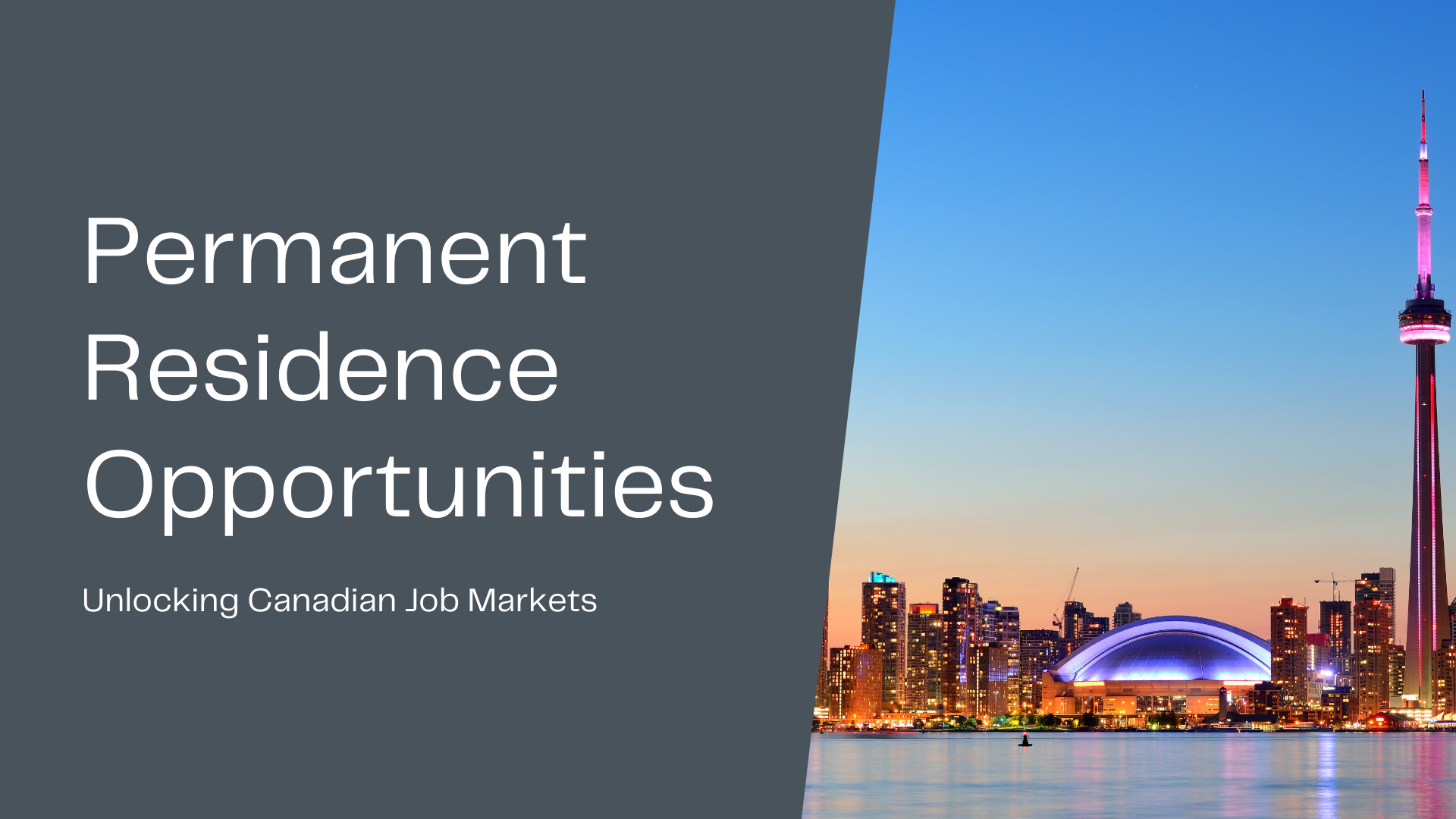Canada is one of the most sought-after destinations for international students, offering high-quality education, diverse cultural experiences, and beautiful natural surroundings. After completing your studies in Canada, many students choose to stay and build a career, but how can you make this transition? For many, applying for permanent residency (PR) is the next logical step. This blog will guide you through the process, eligibility criteria, and the various pathways available for international students to obtain Canadian PR.
Why Opt for Canada PR After Study?
Canada offers several reasons why international students choose to apply for permanent residency after their studies:
- High Quality of Life: Canada consistently ranks as one of the best places to live globally due to its excellent healthcare, education system, and vibrant, multicultural cities.
- Work Opportunities: A PR status allows you to work anywhere in Canada and take advantage of the diverse job market.
- Pathways to Citizenship: With PR, you are one step closer to obtaining Canadian citizenship, offering long-term benefits for you and your family.
- Immigration-Friendly Policies: Canada's immigration system is known for its relatively transparent and fair processes, which aim to support skilled workers, entrepreneurs, and students looking to stay and contribute to the country’s economy.
How to Get Canadian PR After Study
Permanent Residency (PR) in Canada after completing your studies is achievable, but it requires you to meet specific criteria and follow the immigration process. So, the question is, "How can I get PR in Canada after study?" There are various pathways you can explore, such as the Express Entry System, Post-Graduation Work Permit (PGWP), and Provincial Nominee Programs (PNPs). Let’s break down the most common options available.
1. Express Entry System
The Express Entry System is the most popular and fastest pathway to obtaining Canadian PR for skilled workers, including international students. If you want to know how to get PR in Canada after study, this is often the first route to consider.
Eligibility Criteria for Express Entry:
- Language Proficiency: You must demonstrate proficiency in English or French by taking a recognized language test like IELTS or CELPIP (English) or TEF (French).
- Work Experience: At least one year of skilled work experience in Canada (post-study work experience counts here).
- Education: You must have completed a recognized educational program, such as a Canadian degree, diploma, or certificate.
- Age: Applicants between 20-29 years of age typically score the highest points, though those in other age brackets can still apply.
- Other Factors: You will also need to score well in the Comprehensive Ranking System (CRS) based on factors like adaptability, skills, and employment opportunities.
How Express Entry Works:
- Create a Profile: Submit your profile to the Express Entry pool, where you will be ranked based on your CRS score.
- Invitation to Apply (ITA): If your CRS score is high enough, you may receive an ITA, inviting you to apply for permanent residency.
- Submit Your Application: Once you receive an ITA, you have 60 days to submit your PR application with supporting documents, such as proof of work experience, education credentials, language test results, and medical exams.
- Approval and PR Status: If your application is successful, you will receive your Canadian PR.
2. Post-Graduation Work Permit (PGWP)
Post-Graduation Work Permit (PGWP) is an important program that allows international students to stay and work in Canada after graduation, often serving as the first step toward permanent residency. How to get Canadian PR after study using the PGWP is an effective strategy, as it helps you accumulate Canadian work experience, which is vital for PR pathways like Express Entry.
Eligibility Criteria for PGWP:
- Full-time Study: You must have studied full-time in Canada in a program that lasted at least 8 months.
- Designated Learning Institutions (DLI): The institution where you studied must be a DLI recognized by the Canadian government.
- Time Frame: Your PGWP can last anywhere from 8 months to 3 years, depending on the duration of your study program.
How PGWP Leads to PR: Once you have the PGWP, you can work in Canada full-time and gain work experience in a skilled occupation. This work experience can help you qualify for the Canadian Experience Class (CEC) under the Express Entry system. Having Canadian work experience can significantly increase your CRS score, improving your chances of receiving an Invitation to Apply (ITA) for PR.
3. Provincial Nominee Program (PNP)
If you are unable to gain enough points through the Express Entry System, or if you want to explore another option, the Provincial Nominee Program (PNP) is another viable path to Canadian PR.
How PNP Works:
- Nomination by a Province: Certain provinces in Canada have their own immigration streams that allow them to nominate international students for PR. If you study in one of these provinces, you may be eligible to apply for the PNP.
- Eligibility: The requirements for the PNP vary from province to province, but generally, you need to have a job offer from a local employer or meet certain educational and work experience criteria.
- Application Process: After being nominated by a province, you can submit your PR application through the Express Entry system or directly through a provincial application.
Common Provinces with PNP for International Students:
- Ontario: Ontario’s PNP offers several streams for international graduates who have a job offer from an Ontario employer.
- British Columbia: British Columbia offers a Graduate Stream for students who have completed studies at a recognized post-secondary institution in the province.
- Saskatchewan: The Saskatchewan Immigrant Nominee Program (SINP) offers opportunities for international students who have studied in Saskatchewan.
4. Atlantic Immigration Pilot Program (AIPP)
The Atlantic Immigration Pilot Program (AIPP) is a great option for international students who have studied in one of Canada’s Atlantic provinces: New Brunswick, Newfoundland and Labrador, Nova Scotia, and Prince Edward Island.
This program allows graduates to apply for permanent residency with a job offer from a designated employer in one of the Atlantic provinces. How to get permanent residency in Canada after study through AIPP requires you to meet educational and work experience criteria, in addition to having a job offer.
Canada PR Requirements for International Students
To summarize, here are the basic Canada PR requirements for international students:
- Eligibility for Work: You must have legal status to work in Canada, either through a PGWP or post-study work opportunities.
- Skilled Work Experience: The Canadian work experience you gain will play a vital role in your PR application, whether through Express Entry or other programs.
- Language Proficiency: Good proficiency in English or French is essential for PR applications.
- Provincial Nominee Programs: If you studied in a province with a PNP, you may be eligible for a nomination.
- Application to PR Programs: Depending on your eligibility and work experience, you can apply to the Express Entry system or other provincial pathways for PR.
Conclusion
Canada’s immigration system offers multiple pathways to permanent residency for international students, making it an attractive option for those looking to settle and build a future in the country. Whether you’re using the Express Entry system, applying for a Post-Graduation Work Permit (PGWP), or utilizing a Provincial Nominee Program (PNP), the route to Canadian PR after study is attainable with the right planning and eligibility.
Remember that the rules for PR in Canada for international students are constantly evolving, so it’s crucial to stay updated with the latest immigration policies. By gaining Canadian work experience, improving your language skills, and following the appropriate steps, you can pave the way for a successful PR application and enjoy all the benefits of living in Canada as a permanent resident.


